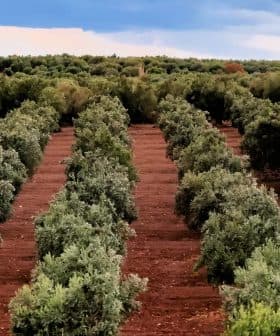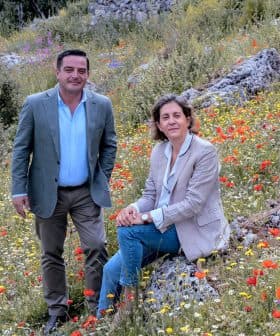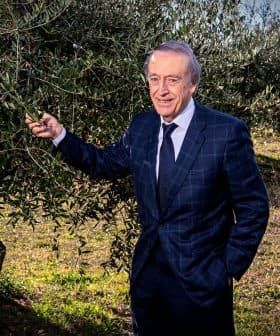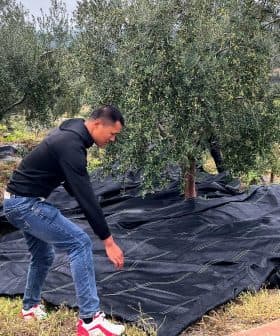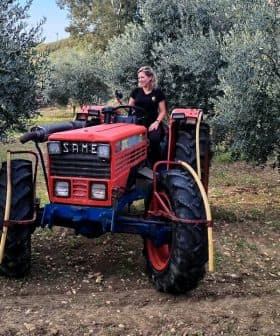Lavandin Introduced in Spanish Olive Groves to Prevent Erosion
Lavandin is the most recent crop being planted in Andalusia to help prevent erosion, promote biodiversity and provide farmers with supplemental income.
The University of Córdoba is leading an effort to introduce lavandin in Andalusian olive groves as a complementary crop to fight erosion, support biodiversity, and promote sustainable development, as part of the European project Diverfarming funded by the European Commission’s Horizon 2020 project. Lavandin, a hybrid of lavender and spike lavender, is easier to cultivate and provides higher yields than lavender, and its cultivation in traditional olive groves can generate additional income for farmers through cash crops and access to European Union grants for sustainable agricultural practices.
Lavandin, a close relative of lavender, has been introduced in Andalusian olive groves as a complementary crop that can help fight erosion, support biodiversity and foster sustainable development.
The effort is part of European project, Diverfarming, and has been led by a team from the University of Córdoba, one of Diverfarming’s European partners.
The effort is part of the European Commission’s Horizon 2020 project that began almost two years ago and addresses food security, sustainable agriculture and silviculture, bio-economy, marine research and water management.
See Also:Olive Tree Cultivation NewsOne of the project’s main goals is to pursue crop diversification, low input farming and the use of management practices that can help improve soil fertility, prevent erosion, increase biodiversity and promote the permanence of young people in rural areas.
Olivares de miel, or honey olives, is a similar effort that is taking place outside of Madrid. It also seeks to prevent erosion and increase biodiversity by planting aromatic shrubs, including lavender.
Erosion, caused by soil loss due to water run-off damage over croplands subject to traditional tilling, is a problem for olive groves that crop diversification attempts to minimize. Significant erosion and low amounts of organic matter are two of the main causes of run-off damage.
Planting aromatic shrubs also helps attract animal species to olive groves, which contributes to biodiversity. Crops, such as lavandin, can also generate complementary income for olive growers and mitigate the economic impacts of poor harvests and off-years.
In Andalusia, Diverfarming works with the University of Córdoba to oversee a 7.4‑acre experimental olive grove that is planted with Picual olive trees. Several different crops have been introduced in between the traditional 12-by-12 meter spacing of the olive trees, which are located in in Torredelcampo, Jaén.
The University of Córdoba’s research team monitors the impact of crop diversification on erosion and productivity, along with its environmental impact and greenhouse gas sequestration.
Lavandin is a hybrid of lavender and spike lavender, with an aroma more intense than that of lavender. It was first cultivated during the late 1920s and is now grown in many parts of Europe.
It is easier to cultivate and provides higher yields than lavender. Lavandin’s costs and yield per acre makes it a profitable option for olive grove alleys.
Prior to planting lavandin in the olive groves, the research group visited Brihuega, which is widely considered the epicenter of Spanish lavender cultivation, to ascertain whether it would be suitable to cultivate in the olive groves.
The researchers determined that the super and grosso varieties were appropriate for the Andalusian experimental olive grove.
Lavandin oil, often a replacement of lavender oil, is used in perfumes, hygiene products and cosmetics. It also works as an insect repellent.
Before planting two rows of grosso variety lavandin this spring, the researchers planted saffron last autumn. Saffron has gastronomic and cosmetic applications and its vegetation cover can help hold the land down, minimizing the impact of rain over the terrain.
Due to their various uses, planting lavandin or saffron in traditional olive groves provides farmers with additional income as cash crops. Their cultivation can also provide olive growers with access to European Union grants, which are disseminated to farmers in the region who practice sustainable agricultural techniques, one of which is promoting biodiversity.
- Diario de Córdoba
- Diverfarming


